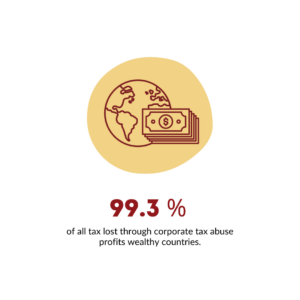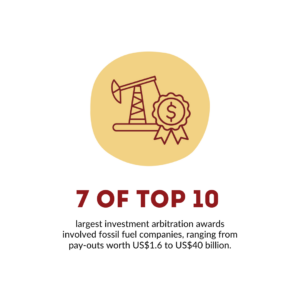join the movement
Women and girls around the world are demanding and creating systemic change and a sustainable future for all. We need collective power to attain a just future – we need you.
Economic Justice1 / 18 / 2024
The 21st century has been marked by a series of overlapping crises, from the climate emergency and biodiversity loss to soaring debt levels, escalating inflation rates, and deepening inequality and poverty—all with severe consequences for the rights of women, girls and gender-diverse people. Women and gender-diverse people face disproportionate consequences of neoliberalism and its manifestations in austerity, debt, and an unequal trade regime. In the face of this “polycrisis,” feminist and peoples’ movements are challenging the unrestrained pursuit of profit and economic growth, championing a radical vision for economic and environmental justice.
This report highlights the significant gap between the contemporary global order and the vision put forward by the Feminist Action Nexus and our allies. To begin to determine how far away we are from this vision—and therefore how to begin to achieve it—this report assesses progress and challenges in seven key areas, corresponding to our key demands.
> Amplification kit: Please share widely with your networks!
As the first in a forthcoming annual series, this report provides a snapshot of recent trends, particularly from the onset of the COVID-19 pandemic in 2020 onwards. Emphasizing the agency of people and communities, this report spotlights both local sites of struggle against the consequences of neoliberalism and global advocacy proposals from civil society and Global South countries to transform our economic system.
To achieve a feminist vision for economic and climate justice, there is a clear need to shift away from our unsustainable models of consumption and resource extraction. Yet, the world’s wealthiest countries and highest income-earners continue to bring in vast profits from fossil fuels, while neglecting to provide development finance according to their obligations and without which Global South countries will find it difficult to achieve sustainable development and climate justice. At current trends of income inequality, women will only achieve gender parity in labor income by 2100.
The proportion of low-income countries at high risk of or in debt distress has skyrocketed; countries are spending ever greater proportions of government revenue on external debt service—far more than on education and health, even at the height of the pandemic. The international response is largely centered around the G20 Common Framework for Debt Treatments established in November 2020, but civil society activists and Southern governments have condemned the Common Framework for its failure to advance debt cancellation, its limited scope, and for forcing countries to take on IMF programs to access debt treatment.
 Tax abuse remains rampant, with hundreds of billions lost per year due to tax evasion by corporations and wealthy individuals. For low-income countries, this loss amounts to nearly half of their public health budgets. Countries remain pressured to keep corporate tax rates low, continuing a decades-long trend, while making up the revenue loss through higher consumption taxes which unduly burden low-earners over the wealthy—often at the direction of institutions like the IMF. The OECD/G20 Inclusive Framework on Base Erosion and Profit Shifting coming into effect in 2024 fails to address the scope of this challenge. However, there are hopes for a breakthrough in establishing a more democratic UN Framework Convention on Tax following a recent proposal published by the UN Secretary General and a UN General Assembly resolution put forward by the African Group and adopted in November 2023.
Tax abuse remains rampant, with hundreds of billions lost per year due to tax evasion by corporations and wealthy individuals. For low-income countries, this loss amounts to nearly half of their public health budgets. Countries remain pressured to keep corporate tax rates low, continuing a decades-long trend, while making up the revenue loss through higher consumption taxes which unduly burden low-earners over the wealthy—often at the direction of institutions like the IMF. The OECD/G20 Inclusive Framework on Base Erosion and Profit Shifting coming into effect in 2024 fails to address the scope of this challenge. However, there are hopes for a breakthrough in establishing a more democratic UN Framework Convention on Tax following a recent proposal published by the UN Secretary General and a UN General Assembly resolution put forward by the African Group and adopted in November 2023.
The International Monetary Fund (IMF) and World Bank have recently developed agendas for gender, climate, and internal reform, yet consistently fail to recognize how their democratic deficits and imposition of strict austerity measures directly harm both people and planet. Even at the height of the pandemic, the IMF made the majority of their loans contingent on the uptake of austerity measures that would only exacerbate the worst impacts of the pandemic on the most marginalized. Transforming the role of the BWIs is a fundamental precondition to a more feminist global economic governance structure, and at the very least must begin with quota reform to shift power away from the richest countries currently dominating the IMF.
 Despite the links between gender and trade being increasingly mainstreamed by the World Trade Organization (WTO) and the inclusion of gender policies in free trade agreements, global patterns in and governance of trade continue to take a siloed and neoliberal approach towards human rights. There is an escalating influx of trade deals negotiated outside the WTO which expand the remit of trade governance beyond explicit trade issues to include non-trade issues. These rules constrain the abilities of Global South countries to implement regulations in a way that is necessary to achieve gender equality. Meanwhile, extractivist fossil fuel capitalism continues to be promoted by the current trade regime, both through the use of investor-state dispute settlement mechanisms by corporations to arbitrate against countries implementing environmental standards, and through a new era of export-oriented “green” extractivism of critical raw materials like lithium.
Despite the links between gender and trade being increasingly mainstreamed by the World Trade Organization (WTO) and the inclusion of gender policies in free trade agreements, global patterns in and governance of trade continue to take a siloed and neoliberal approach towards human rights. There is an escalating influx of trade deals negotiated outside the WTO which expand the remit of trade governance beyond explicit trade issues to include non-trade issues. These rules constrain the abilities of Global South countries to implement regulations in a way that is necessary to achieve gender equality. Meanwhile, extractivist fossil fuel capitalism continues to be promoted by the current trade regime, both through the use of investor-state dispute settlement mechanisms by corporations to arbitrate against countries implementing environmental standards, and through a new era of export-oriented “green” extractivism of critical raw materials like lithium.
The corporate capture of global governance and development is most evident in the growing trend towards “multistakeholderism” promoted even at the UN. Multistakeholderism in principle invites a range of stakeholders to participate in global governance (at the expense of a waning voice for governments), but in practice gives multinational corporations undue influence in policy-making, standard-setting, and the distribution of public goods. This has been evident in the UN’s increasing endorsement of private-public partnerships to close the “development financing gap,” and through proposed partnerships like the (now cancelled) agreement between UN Women and BlackRock, the world’s largest investment firm.
Although climate finance has grown year-on-year, Global North countries have failed to deliver on the commitment established in 2009 at COP15 to provide and mobilize US$100 billion in climate finance per year by 2020. Climate finance is also largely disbursed through loans, exacerbating the debt crisis, which locks countries further into climate vulnerability. It insufficiently focuses on addressing loss and damage, does not reach the countries that need it most, and fails to account for the need to be gender-responsive.
Visit the report website and download the report in English, Spanish, French, or Arabic (coming soon).
The Feminist Action Nexus for Economic and Climate Justice coordinates collective advocacy and knowledge-sharing to promote the necessary transformation away from the fossil-fuel capitalism, neoliberalism, patriarchy and white supremacy that drive both the climate crisis and rampant inequality. The initiative aims to urgently and radically transform our approach to economic growth, our systems of production and consumption, and the rules that govern our macroeconomic and multilateral systems.
The conceptual framing for the Action Nexus is grounded in three key resources published in 2021:
Women and girls around the world are demanding and creating systemic change and a sustainable future for all. We need collective power to attain a just future – we need you.

